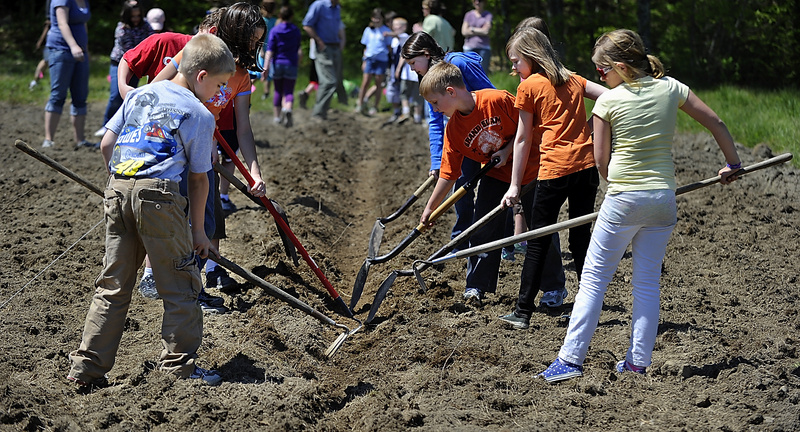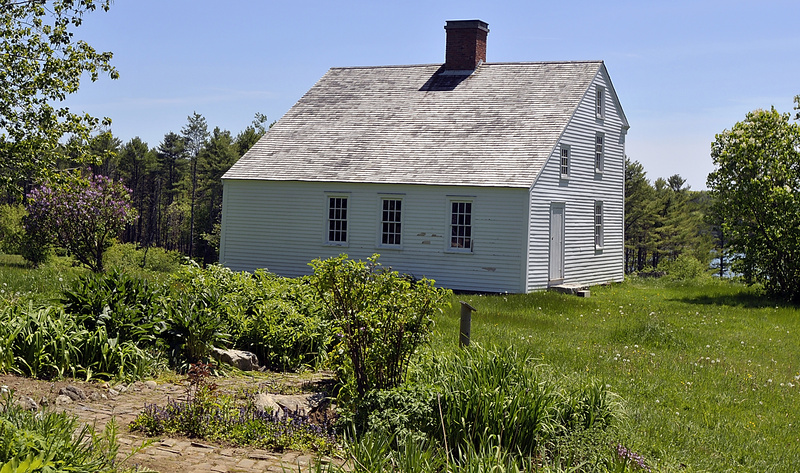For years Pettengill Farm was an unusual museum set beside the Harraseeket River.
Situated on 140 acres of fields and woodland, the Pettengill Farm is a living postcard from a different century, less than two miles from the buzz of Route 1.
This summer the Freeport Historical Society and locals plan to turn the 200-year-old farmhouse into a more authentic experience by bringing back the farm fields around it that have gone unused for a half-century.
“We hope this program will connect families and children and help them enjoy the outdoors, and learn something while they’re on the trails,” said Christina White, executive director of the historical society, which manages the preserve.
In 1810, Pettengill Farm was a saltwater farm complete with a tiny saltbox home. Today it is a museum, nature preserve and a rare retreat that is listed in the National Register of Historic Places.
It was donated to the historical society in 1975 by Eleanor Houston and Lawrence M.C. Smith and was restored by the society.
However, White said many Mainers, even some in Freeport, know nothing about this vast preserve that is less than two miles from the Freeport outlets.
Mike Abbott, owner of Abbott Farms in Durham, donated his time to till the soil and ready the fields for the work of planting two crops, a pumpkin patch and cornfield. Local school children helped.
On May 17 fourth-graders from Mast Landing School in Freeport came to help Abbott plant the seeds and turn the soil.
So the project achieved two goals: It turned a historical place back into a farm and taught local children the ways of farmers. Both efforts are lacking today, Abbott said.
“I just thought it’s a historic farm that could be brought back into use when farms are going the other way,” Abbott said. “I think people probably appreciate the scenic trails. But I’m thinking it’s important they realize this was a working farm.”
Nobody knows if the farm will be successful, not even Abbott. He used manure from his chickens to fertilize the fields. But other than a scarecrow, there isn’t much to keep pests away, and in Freeport there are many, such as deer, raccoons, turkeys and porcupines.
“My cornstalks were pushed over. I went out one night to see and saw a porcupine walking up it and pushing it down, and then eating it,” Abbott said. “If Mother Nature is willing to make corn, we’ll make a corn maze.”
It’s an experiment, but one Abbott, the Pettengill community and local children are excited about now.
Crystal Boucher, a teacher at Mast Landing School who came to the farm with her students, said most of her students had not been to the 140-acre preserve, even though they did a play about Pettengill Farm this winter.
“I’m hoping it will spark their interest, that they’ll come back in the fall to see what they’ve created,” Boucher said. “The play helped them understand how important the history is, and how important it is to keep it going.”
And in this renewed effort to make the 140-acre preserve more welcoming to the public, the youth at Mast Landing School also created signs that explain the flora, fauna and social history of the natural landscape.
There are 33 signs going up on 3.5 miles of trails. It brings the youth closer to this land, but also brings the land closer to those who visit, White said.
It’s also about making the community more aware of it.
White wants more people to come picnic or fly kites or pull up a kayak at the farm’s shores.
There is talk of one day building a barn, White said, which would bolster the kind of educational programs the society does at the farm.
And it all may start with a few successful crops.
“This year let’s plant and see what happens,” Abbott said.
Staff Writer Deirdre Fleming can be contacted at 791-6452 or at:
dfleming@pressherald.com
Copy the Story Link
Send questions/comments to the editors.





Success. Please wait for the page to reload. If the page does not reload within 5 seconds, please refresh the page.
Enter your email and password to access comments.
Hi, to comment on stories you must . This profile is in addition to your subscription and website login.
Already have a commenting profile? .
Invalid username/password.
Please check your email to confirm and complete your registration.
Only subscribers are eligible to post comments. Please subscribe or login first for digital access. Here’s why.
Use the form below to reset your password. When you've submitted your account email, we will send an email with a reset code.